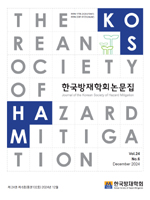
재난대응상황에서 소방공무원의 윤리적 리더십에 대한 주관성 연구: A 소방재난본부 119안전체험관을 중심으로
Subjectivity Study on Ethical Leadership for Fire Officials in Disaster Response Situations: Focusing on 119 Safety Experience Center at “A” Fire and Disaster Headquarters
- 한국방재학회
- 2. 한국방재학회 논문집
- 24권 6호
- : KCI등재
- 2024.12
- 145 - 153 (9 pages)
본 연구는 재난이라는 상황적 맥락에서 소방공무원들이 생각하는 윤리적 리더십에 대한 주관적 인식을 탐구하였다. 이를 위해 A 소방재난본부 119안전체험관 소속 소방공무원 14명을 대상으로 Q 방법론을 활용한 대면조사를 실시하였다. 분석결과는 다음과 같다. 재난대응상황에서 소방공무원들의 윤리적 리더십에 대한 인식은 3가지 유형으로 구분되었다. 각 유형의 특징의 정리하면 「포용적이며 윤리성 중시, 자신의 판단 우선」, 「신뢰와 협력 중시, 실용적인 접근 지향」, 「책임 중시, 존중과 신중한 접근 지향」으로 구분된다. 본 연구를 통해 도출된 3가지 유형의 윤리적 리더십을 통해 유형별 맞춤형 리더십 교육이 가능하고, 재난대응 시 소방 조직 내 역할분담에 적용할 수 있다. 이를 통해 재난대응상황에서 의사소통 방법을 배울 수 있고, 효과적인 인력 운용에 기여할 수 있다.
This study explored firefighters’ subjective perceptions of ethical leadership in disaster situations. The study used the Q methodology to conduct a face-to-face survey with 14 firefighters at the 119 Safety Experience Center at “A” Fire and Disaster Headquarters. The results indicate that the respondents’ perceptions of ethical leadership in disaster response situations can be divided into three types, each with distinct characteristics: the first is inclusive and ethical, prioritizing one’s own judgment; the second is oriented toward trust, cooperation, and a pragmatic approach; and the third is oriented toward responsibility, respect, and a cautious approach. This study’s findings can be used to customize leadership training for each of the three ethical leadership types and enable an appropriate allocation of roles within fire organizations during disaster response. This will help firefighters improve their communication in disaster response situations and will enhance manpower management.
1. 서 론
2. 이론적 논의
3. 연구설계
4. 분석결과
5. 결론 및 시사점
References